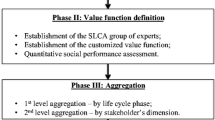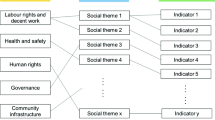Abstract
Purpose
The implementation of midpoint, endpoint, and single score assessments to support decision-making remains a major challenge for developing a coherent social impact assessment methodology. The simple weighted sum approach and normalization technique for single score assessments have been problematic and the final results do not realistically represent stakeholder perspectives due to mis/over-interpretations. The focus of this study is to develop a weighting scheme for social impact assessment. The developed scheme is then evaluated using a case study on social impact assessment of the sugarcane sector in Thailand.
Methods
A weighted aggregation method has been developed for assessing different categories and sub-categories of social dimensions. The performance indicators for each sub-category determine the accuracy of the impact results by establishing the rating weight of the importance of social aspects and satisfaction. The developed method is then applied to a case study on sugarcane-based ethanol production in Thailand. The stakeholders involved in the sugarcane sector comprising sugarcane, sugar, and ethanol production include cane growers, cane workers, sugar factory, and ethanol factory workers. The social issues related to stakeholders in sugarcane, sugar, and ethanol production must fit the cause-effect chain, which can help not only in defining the specific social aspects to meet the appropriate sub-categories and performance indicators but also in facilitating the data collection.
Results and discussion
The characterized/inventory result can be improved by using the weighting factor of importance of social aspects and satisfaction. The results of the social impact performance score reveal that including the weighting of the importance of social aspects and satisfaction affects the result of the impact sub-categories and social categories. The case study revealed that the relevant impact categories of cane growers are (1) land tenure; (2) access to knowledge, facility, and natural resources; (3) employment, wages, and labor conditions; (4) equity; and (5) human health and safety. On the other hand, the impact categories of cane workers, sugar factory workers, and ethanol factory workers are (1) decent livelihood, (2) labor rights, (3) equity, and (4) human health and safety.
Conclusions
The social impact assessment method with developed weighting scheme can help the government and private sectors prioritize their efforts in minimizing negative social impacts throughout the life cycle of biofuel systems. However, the data on the importance of social aspects and satisfaction is subjective; uncertainty analysis or sensitivity analysis must therefore be applied to further observe the variation of different options to facilitate decision-making.


Similar content being viewed by others
References
Aparcana S, Salhofer S (2013) Development of a social impact assessment methodology for recycling systems in low-income countries. Int J Life Cycle Assess 18:1106–1115
Blok K, Huijbregts M, Roes L, van Haaster B, Patel M, Hertwich E, Wood R, Hauschild MZ, Sellke P, Antunes P, Hellweg S, Ciroth A, Harmelink M (2013) A novel methodology for the sustainability impact assessment of new technologies. The EC 7th framework project, Utrecht, Netherland
Bonsucro (2014) Bonsucro production standard version 4.01. Bonsucro, London
Carmo BBT, Margni M, Baptiste P (2017a) Addressing uncertain scoring and weighting factors in social life cycle assessment. Int J Life Cycle Assess 22:1609–1617
Carmo BBT, Margni M, Baptiste P (2017b) Customized scoring and weighting approaches for quantifying and aggregating results in social life cycle impact assessment. Int J Life Cycle Assess 22:2007–2017
Chhipi-Shrestha GK, Hewage K, Sadiq R (2015) “Socializing” sustainability: a critical review on current development status of social life cycle impact assessment method. Clean Techn Environ 17(3):579–596
Ciroth A, Franze J (2011) LCA of an ecolabeled notebook: consideration of social and environmental impacts along the entire life cycle. Federal Public Planning Service Sustainable Development, Brussels
Dreyer LC, Hauschild MZ, Schierbeck J (2010) Characterisation of social impacts in LCA part 1: development of indicators for labor rights. Int J Life Cycle Assess 15:247–259
FAO (2011) The global bioenergy partnership (GBEP) sustainability indicators for bioenergy. Food and Agriculture Organization of the United Nations, Rome. http://www.globalbioenergy.org/fileadmin/user_upload/gbep/docs/Indicators/The_GBEP_Sustainability_Indicators_for_Bioenergy_FINAL.pdf. Accessed 25 May 2017
FAO (2014) Sustainability assessment of food and agriculture systems guidelines version 3.0. Natural Resources Management and Environment Department, Food and Agriculture Organization of the United Nations, Rome. http://www.fao.org/3/a-i3957e.pdf. Accessed 30 Mar 2019
Feschet P, Macombe C, Garrabe’ M, Loeillet D, Saez AR, Benhmad F (2012) Social impact assessment in LCA using the Preston pathway. Int J Life Cycle Assess 18:490–503
Fontes J (2014) Handbook for product social impact assessment, Roundtable for Product Social Metrics. Sustainability Consultant at PRé Sustainability, Version 2.0 – September 2014, p 137. https://product-social-impactassessment.com/roundtable-for-product-social-metrics/. Accessed 24 Mar 2019
Foolmaun R, Ramjeeawon T (2013) Comparative life cycle assessment and social life cycle assessment of used polyethylene terephthalate (PET) bottles in Mauritius. Int J Life Cycle Assess 18:155–171
Giner-Santonja G, Aragonés-Beltrán P, Niclós-Ferragut J (2012) The application of the analytic network process to the assessment of best available techniques. J Clean Prod 25:86–95
Hosseinijou SA, Mansour S, Shirazi MA (2014) Social life cycle assessment for material selection: a case study of building materials. Int J Life Cycle Assess 19(3):620–645
Ibáñez-Forés V, Bovea MD, Pérez-Belis V (2014) A holistic review of applied methodologies for assessing and selecting the optimal technological alternative from a sustainability perspective. J Clean Prod 70:259–281
ISO 14044 (2006) Environmental management – life cycle assessment – requirements and guidelines
Jørgensen A, Le Bocq A, Nazarkina L, Hauschild M (2008) Methodologies for social life cycle assessment. Int J Life Cycle Assess 13(2):96–103
Kroeger A, Weber C (2014) Developing a conceptual framework for comparing social value creation. Acad Manag Rev 39(4):513–540
Kruse SA, Flysjö A, Kasperczyk N, Scholz AJ (2008) Socioeconomic indicators as a complement to life cycle assessment—an application to salmon production systems. Int J Life Cycle Assess 14(1):8–18
Manik Y, Leahy J, Halog A (2013) Social life cycle assessment of palm oil biodiesel: a case study in Jambi province of Indonesia. Int J Life Cycle Assess 18:1386–1392
Martín-Gamboa M, Iribarren D, García-Gusano D, Dufour J (2017) A review of life-cycle approaches coupled with data envelopment analysis within multi-criteria decision analysis for sustainability assessment of energy systems. J Clean Prod 150:164–174
Parent J, Cucuzzella C, Revéret JP (2010) Impact assessment in SLCA: sorting the sLCIA according to their outcomes. Int J Life Cycle Assess 15:164–171
Quantis, Agéco, Ciraig (2012) Environmental and socioeconomic life cycle analysis of Canadian milk. Montréal, p 253. https://www.dairyresearch.ca/pdf/LCA-DFCFinalReport_e.pdf. Accessed 21 June 2012
Russo Garrido S, Parent J, Beaulieu L, Revéret JP (2018) A literature review of type I SLCA – making the logic underlying methodological choices explicit. Int J Life Cycle Assess 23:432–444
Sanchez Ramirez PKS, Petti L, Haberland NT, Lie Ugaya CM (2014) Subcategory assessment method for social life cycle assessment. Part 1: methodological framework. Int J Life Cycle Assess 19(8):1515–1523
Sawaengsak W, Gheewala SH (2017) Analysis of social and socio-economic impacts of sugarcane production: a case study in Nakhon Ratchasima province of Thailand. J Clean Prod 142:1169–1175
Spillemaeckers S, Vanhoutte G, Taverniers L, Lavrysen L, van Braeckel D, Mazijn B, Rivera JD (2004) Ecological, social and economical aspects of integrated product policy. Integrated product assessment: the development of the label ‘sustainable development’ for products. Belgian Science Policy, Brussels
Traverso M, Asdrubali F, Francia A, Finkbeiner M (2012) Towards life cycle sustainability assessment: an implementation to photovoltaic modules. Int J Life Cycle Assess 17:1068–1079
UNEP (2009) Guidelines for social life cycle assessment of products. United Nations Environment Program, Paris. http://www.unep.fr/shared/publications/pdf/dtix1164xpa-guidelines_slca.pdf. Accessed 28 Feb 2012
Wang JJ, Jing YY, Zhang CF, Zhao JH (2009) Review on multi-criteria decision analysis aid in sustainable energy decision-making. Renew Sust Energ Rev 13:2263–2278
Weidema BP (2006) The integration of economic and social aspects in life cycle impact assessment. Int J Life Cycle Assess 11(1):89–96
Weldegiogis GS, Franks DM (2014) Social dimensions of energy supply alternatives in steelmaking: comparison of biomass and coal production scenarios in Australia. J Clean Prod 84:281–288
Wu SR, Yang D, Chen J (2014) Social life cycle assessment revisited. Sustainability 6(7):4200–4226
Yang QZ, Chua BH, Song B (2009) A matrix evaluation model for sustainability assessment of manufacturing technologies. Int J Ind Manuf Eng 3(8):953–958
Yu OY, Guikema SD, Briaud JL, Burnett D (2012) Sensitivity analysis for multi attribute system selection problems in onshore environmentally friendly drilling (EFD). Syst Eng 15(2):153–171
Acknowledgments
The research has been carried out under the thesis “Social Assessment of Biofuel Systems in Thailand” supported by the Thailand Research Fund under the Royal Golden Jubilee Ph.D. program (Grant PHD/0124/2559) and the project “Research Network for LCA and Policy on Food, Fuel, and Climate Change supported by the National Science and Technology Development Agency, Thailand as well as the Joint Graduate School of Energy and Environment, King Mongkut’s University of Technology Thonburi, Thailand and Department of Management Engineering, Technical University of Denmark.
Author information
Authors and Affiliations
Corresponding author
Additional information
Responsible editor: Marzia Traverso
Publisher’s note
Springer Nature remains neutral with regard to jurisdictional claims in published maps and institutional affiliations.
Electronic supplementary material
ESM 1
(DOCX 21 kb)
Rights and permissions
About this article
Cite this article
Sawaengsak, W., Olsen, S.I., Hauschild, M.Z. et al. Development of a social impact assessment method and application to a case study of sugarcane, sugar, and ethanol in Thailand. Int J Life Cycle Assess 24, 2054–2072 (2019). https://doi.org/10.1007/s11367-019-01624-8
Received:
Accepted:
Published:
Issue Date:
DOI: https://doi.org/10.1007/s11367-019-01624-8




